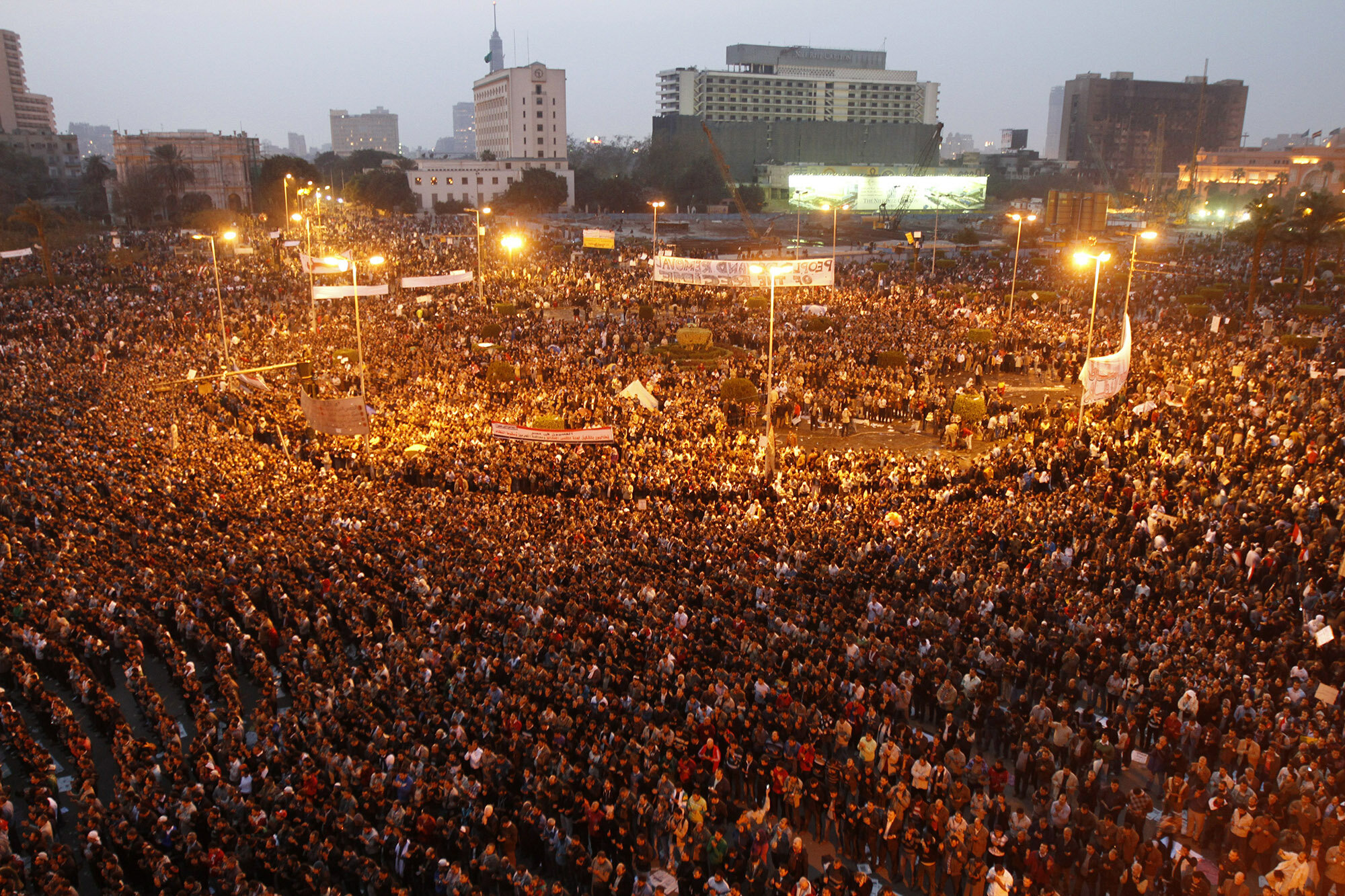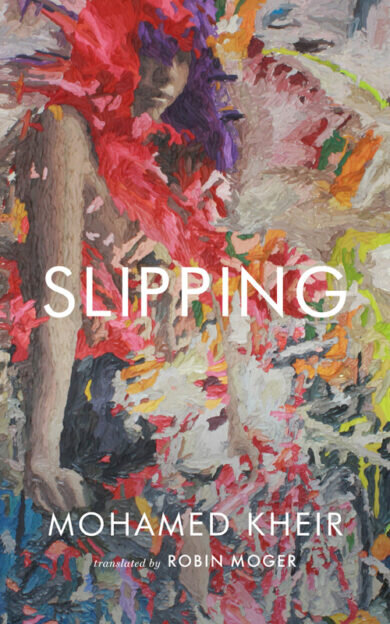
Slipping, a novel by Mohamed Kheir
Translated from the Arabic by Robin Moger
Two Lines Press (June 2021)
ISBN 9781949641165
Farah Abdessamad
There’s nothing more desirable and mysterious than the interstitial, fleeting moment between the world of dreams and non-dreams. It’s a daze when time and place briefly disunite to reveal a blurry window of infinite possibilities — of realities. In Slipping, Egyptian author Mohamed Kheir takes us on a fantastical journey set in post-Arab Spring Egypt, to known physical places and an undetermined geography of the mind.

Slipping is Kheir’s first novel to be translated into English by Robin Moger (a translator of Haytham El Wardany and Youssef Rakha among others). The story follows Seif, a sorrowful, haggard and daydreaming writer, and his adventures with Bahr, an Egyptian who has just returned from an unspecified country abroad.
It’s unclear why Bahr chooses Seif to cover his travels around Egypt for an unnamed magazine.
“I’d only met the man once and my name wasn’t well known enough to have caught the attention of an Egyptian overseas. The only way it would have gotten there is if I’d sailed ahead of it. Then, perhaps because Bahr did seem to know me and had requested me by name, a faint enthusiasm began to glow and catch inside me.”
Bahr may be a projection of Seif’s own mind and delusion — an imaginary, symbolic guide or gatekeeper to an “other-life” or the webs of sub-consciousness. Bahr is a stranger yet his ruffled charm and charisma possess the familiarity of a regular visitor. It’s as if Seif would need to exorcize himself from his spirit to find peace in the awakened world.
The two men travel together around Cairo, Alexandria and vicinity in a post-Revolutionary landscape which paradoxically embodies both a welcomed escape and a gripping dystopia. They walk on water. They encounter no places and empty places. It’s an overwhelming feeling of strangeness which permeates through these recollections.
“Love is Death – or – How I Realized I wasn’t in Love with Irene” is a chapter devoted to Bahr’s monologue in which he shares with Seif details of his romantic relationship with a woman called Irene. Bahr exposes himself as a vulnerable man; his memories are poignant and his story with Irene underlines the issues of self-sabotage, racism, gender-based violence and masculinity, and the necessity of standing up for justice. Bahr meets Irene. They fall in love and soon enough a child is born. The external world spits intolerance at them — and her specifically, as the partner of a black man. Bahr one day comes to grips, rather physically, with Irene’s teenage male harasser and upon seeing his inanimate body, concludes that he can no longer go home — he must flee. We’re not certain he killed the man yet the abandonment of his family becomes unavoidable. While telling his story, Bahr reflects on passing time and the nature of love which can either stir or kill.
“Like, in every relationship, there’s a third wheel, which is time. And in my relationship with Irene it was the third wheel that I loved.”
Despite the pedantic name of the chapter, it’s the testimony of a man still deeply in love and largely dealing with regret. It’s complex and transfixing and I would have wished to see Bahr’s story more developed in the book as it mirrors Seif’s own hopes and failures.
Other female characters transcend such evanescent descriptions and their presence lingers. There is Alya and her enchanting if not entrancing, siren-like voice and Leila, Seif’s girlfriend. Both women’s fates collide with Egypt’s Revolution and mass protests and their commonalities are uncanny to the point of seeming interchangeable like avatars.
“What else?”
“Everything.” She smiled. “All the sounds.”
Himar: the sound of falling rain. Ajij: the sound of flame. Flutterings, tricklings, grazings, trillings. Sounds I didn’t know had names, names I didn’t know had sounds, and Alya knew every one, could sing them all. In the morning, humming; in the evening, singing; at midday taking me on a journey through the sounds of every wave there was.”
Realms that Seif and Bahr visit intertwine with the distinct blurriness of early morning semi-consciousness — this is both compelling but also disorientating for the reader. I often questioned whose point of view I was exposed to and while appreciating meandering, braided scenes (which spectacularly come together at the end of the novel) it left me short of desiring a less perplexing structure in the first part of the book which largely focuses on slow world-building.

For instance, we follow Bahr and Seif’s discovery of the abandoned village of Wahda, emptied as its former residents fled by boat. It’s a desolate and enigmatic scene, with a backstory only revealed later in the book which also ties in with other flashbacks. This disjointed narrative style, characteristic of Slipping, is not always easy to follow without literary guidance and a map. At times, one may have wished to stay closer to the two protagonists and delve more deeply in their nascent bond and arcs.
Seif finds comfort in sleep (“Back home, I tossed and turned, caught between sleep and waking, between life and death.”) which provides a window to dull painful memories. The chapter “Beware Flowers,” with its evocation of a “death flower,” is a metaphorical rendition of tense protest days and conveys a looming prophesy of impending disaster, such as in the voice of Alya:
“She looked at me, questioning, and I reminded her of the night she’d woken full of foreboding.
Through the rough music of the crowds she stared at me, quite silent. Then, as though we both knew the answer, she asked, ‘You really think I was wrong?’”
Alya’s rhetorical question doesn’t refer to the euphoric days of 2011 but rather the long winter which came after the Arab Spring. The protests in Slipping carry a menacing, effluent undertone with the characters struggling to escape their magnetism.
In this oneiric journey of fiction, Kheir wants us to imagine the infinity of the mind and how to deal with despair and trauma. Memories of arrests and brutality populate the novel in darting expressionistic strokes. Kheir’s previous short story collections Remsh Al Ein (2016) and Afarit Al Radio (2011) received the Sawiris Cultural Award, and translation of his work has appeared in English in The Book of Cairo: A City in Short Fiction, edited by Raph Cormack (2019).
Through fantastical depictions, Kheir asks whether we can ever let go of our ghosts — can we let go of them before they consume us? For a region which has experienced collective trauma for so long, this is indeed a pressing message, which calls for healing and, one day, dreaming together.



